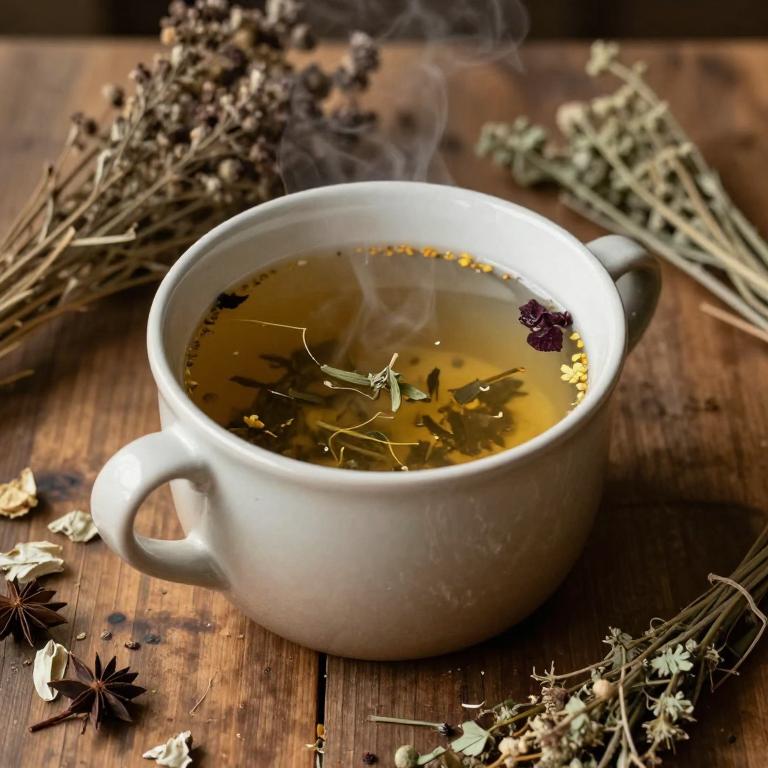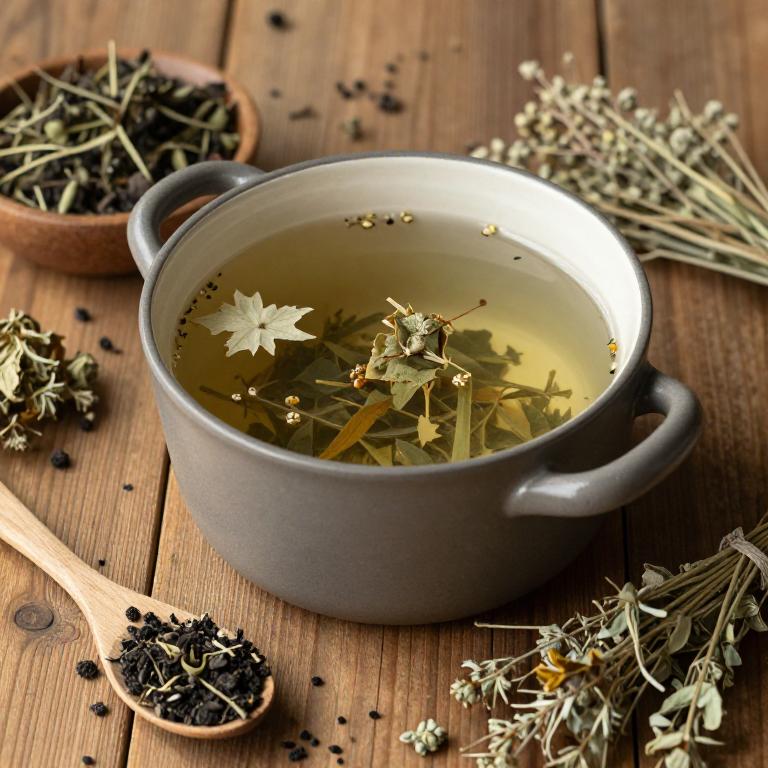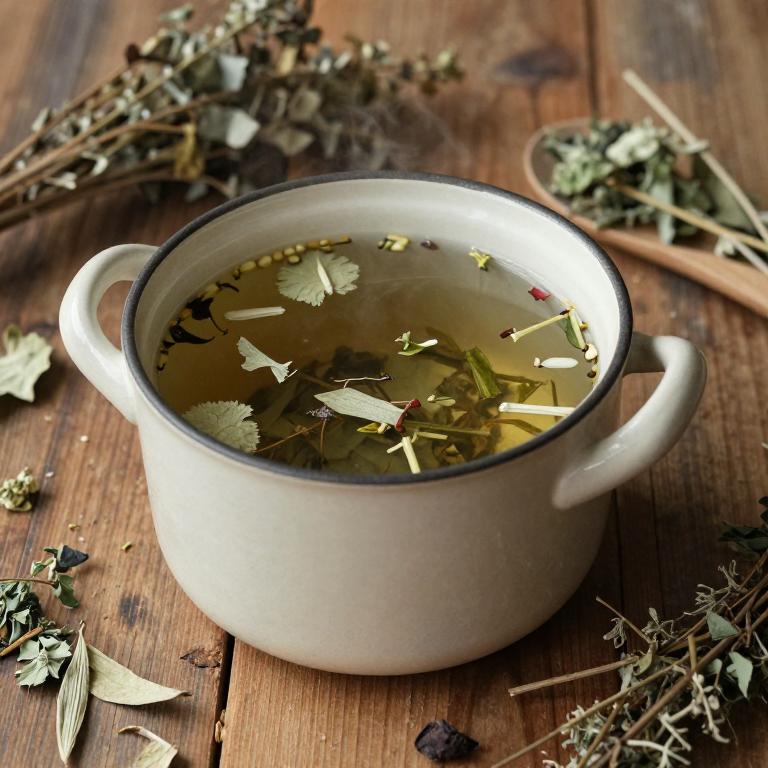10 Best Herbal Decoctions For High Cholesterol

Herbal decoctions have been traditionally used to support cardiovascular health and manage high cholesterol levels.
Commonly used herbs include garlic, ginger, turmeric, and green tea, which are believed to help lower LDL cholesterol and improve overall lipid profiles. These decoctions are typically prepared by simmering the herbs in water for an extended period to extract their active compounds. While some studies suggest that certain herbs may have beneficial effects, more research is needed to confirm their efficacy and safety.
It is important to consult with a healthcare professional before using herbal decoctions as part of a cholesterol management plan.
Table of Contents
- 1. Garlic (Allium sativum)
- 2. Common grape (Vitis vinifera)
- 3. Salvia (Salvia officinalis)
- 4. Thistle (Silybum marianum)
- 5. Stinging nettle (Urtica dioica)
- 6. Ginger (Zingiber officinale)
- 7. Turmeric (Curcuma longa)
- 8. Licorice (Glycyrrhiza glabra)
- 9. Ceylon cinnamon (Cinnamomum verum)
- 10. Bael tree (Aegle marmelos)
1. Garlic (Allium sativum)

Allium sativum, commonly known as garlic, has been traditionally used for its medicinal properties, including its potential benefits in managing high cholesterol.
Herbal decoctions made from fresh or dried garlic cloves are often prepared by simmering the bulbs in water for an extended period to extract their active compounds. These decoctions are believed to contain allicin, a sulfur-containing compound known for its antimicrobial and cardiovascular effects. Studies suggest that regular consumption of garlic decoctions may help reduce low-density lipoprotein (LDL) cholesterol levels, often referred to as "bad" cholesterol.
However, while garlic is generally considered safe, it is advisable to consult a healthcare professional before using it as a supplement, especially for individuals with existing health conditions or those on medication.
2. Common grape (Vitis vinifera)

Vitis vinifera, commonly known as the common grape vine, has been traditionally used in herbal medicine for its potential cardiovascular benefits.
Herbal decoctions made from the leaves and seeds of Vitis vinifera are believed to support healthy cholesterol levels by promoting the excretion of bile acids and reducing the absorption of dietary fats. These decoctions may contain bioactive compounds such as resveratrol, which has been studied for its antioxidant and anti-inflammatory properties. While some preliminary research suggests that Vitis vinifera extracts may help lower LDL cholesterol, more clinical studies are needed to confirm their efficacy and safety in humans.
As with any herbal remedy, it is important to consult a healthcare professional before incorporating Vitis vinifera decoctions into a cholesterol management plan.
3. Salvia (Salvia officinalis)

Salvia officinalis, commonly known as sage, has been traditionally used for its medicinal properties, including potential benefits for cardiovascular health.
Herbal decoctions made from sage leaves may help in managing high cholesterol by promoting the metabolism of lipids and reducing oxidative stress in the body. Some studies suggest that compounds in sage, such as flavonoids and phenolic acids, may inhibit the absorption of cholesterol in the digestive tract. However, more clinical research is needed to fully understand its efficacy and safety in treating hyperlipidemia.
As with any herbal remedy, it is advisable to consult a healthcare professional before incorporating sage decoctions into a cholesterol management plan.
4. Thistle (Silybum marianum)

Silybum marianum, commonly known as milk thistle, is a herbal plant that has been traditionally used for its potential health benefits, including supporting liver function.
Herbal decoctions made from silybum marianum are often prepared by simmering the seeds or leaves in water to extract their active compounds, such as silymarin. Some studies suggest that silymarin may help reduce cholesterol levels by improving lipid metabolism and protecting against oxidative stress. However, while preliminary research is promising, more clinical trials are needed to confirm its effectiveness for high cholesterol.
As with any herbal remedy, it is important to consult a healthcare professional before using silybum marianum, especially if you are on medications or have existing health conditions.
5. Stinging nettle (Urtica dioica)

Urtica dioica, commonly known as stinging nettle, has been traditionally used in herbal medicine for its potential health benefits, including supporting cardiovascular health.
When prepared as a decoction, stinging nettle involves boiling the dried leaves and stems in water to extract its bioactive compounds. Studies suggest that urtica dioica may help lower cholesterol levels by promoting the excretion of bile acids and reducing the absorption of dietary fats. Its high content of minerals such as potassium, magnesium, and antioxidants may contribute to improved lipid metabolism.
However, while some preliminary research supports its use, it is important to consult a healthcare professional before incorporating it into a cholesterol management regimen.
6. Ginger (Zingiber officinale)

Zingiber officinale, commonly known as ginger, has been traditionally used in herbal medicine for its various health benefits, including its potential role in managing high cholesterol.
Herbal decoctions made from fresh or dried ginger roots contain bioactive compounds such as gingerol and shogaol, which may help reduce low-density lipoprotein (LDL) cholesterol levels. Studies suggest that regular consumption of ginger decoctions can enhance lipid metabolism and inhibit the synthesis of cholesterol in the liver. While more research is needed to confirm its efficacy, some clinical trials indicate that ginger may support cardiovascular health when used as part of a holistic approach.
As with any herbal remedy, it is advisable to consult a healthcare professional before incorporating ginger decoctions into a cholesterol management plan.
7. Turmeric (Curcuma longa)

Curcuma longa, commonly known as turmeric, contains curcumin, a bioactive compound with potential cardiovascular benefits.
Herbal decoctions made from Curcuma longa have been traditionally used in Ayurvedic and Chinese medicine to support overall health, including cardiovascular function. Studies suggest that curcumin may help lower LDL cholesterol levels by reducing oxidative stress and inflammation in the body. However, the effectiveness of curcumin in reducing cholesterol can be enhanced when combined with black pepper extract, which increases its bioavailability.
While curcuma longa decoctions may offer supportive benefits for managing high cholesterol, they should not replace prescribed medical treatments without consulting a healthcare professional.
8. Licorice (Glycyrrhiza glabra)

Glycyrrhiza glabra, commonly known as licorice root, has been traditionally used in herbal medicine for its potential health benefits, including its impact on cholesterol levels.
Herbal decoctions made from glycyrrhiza glabra may help in reducing LDL cholesterol, often referred to as "bad" cholesterol, due to its anti-inflammatory and antioxidant properties. However, excessive consumption of licorice root can lead to increased blood pressure and other side effects, so it should be used with caution. Some studies suggest that the active compounds in licorice, such as glycyrrhizin, may influence lipid metabolism, although more research is needed to confirm its efficacy.
As with any herbal remedy, it is advisable to consult a healthcare professional before incorporating glycyrrhiza glabra decoctions into a cholesterol management plan.
9. Ceylon cinnamon (Cinnamomum verum)

Cinnamomum verum, commonly known as cinnamon, has been traditionally used in herbal medicine for its potential cardiovascular benefits.
Herbal decoctions made from the bark of Cinnamomum verum are believed to help lower high cholesterol levels due to their rich content of polyphenols and essential oils. These compounds may inhibit the absorption of cholesterol in the intestines and promote the excretion of bile acids, thereby reducing low-density lipoprotein (LDL) cholesterol. Some studies suggest that regular consumption of cinnamon decoctions may improve lipid profiles and support heart health.
However, it is important to consult a healthcare professional before using cinnamon as a therapeutic remedy, especially for individuals with existing medical conditions or those on medication.
10. Bael tree (Aegle marmelos)

Aegle marmelos, also known as the Indian bael fruit, has been traditionally used in Ayurvedic medicine for its various health benefits, including its potential to lower high cholesterol levels.
The herbal decoction prepared from the fruit's bark, leaves, or seeds is believed to support liver function and enhance the metabolism of lipids, which can help reduce LDL cholesterol. Studies suggest that the bioactive compounds in Aegle marmelos, such as flavonoids and tannins, may inhibit cholesterol synthesis and promote its excretion from the body. Regular consumption of this decoction, under medical supervision, may contribute to improved lipid profiles and cardiovascular health.
However, more clinical research is needed to fully understand its efficacy and safety in managing high cholesterol.